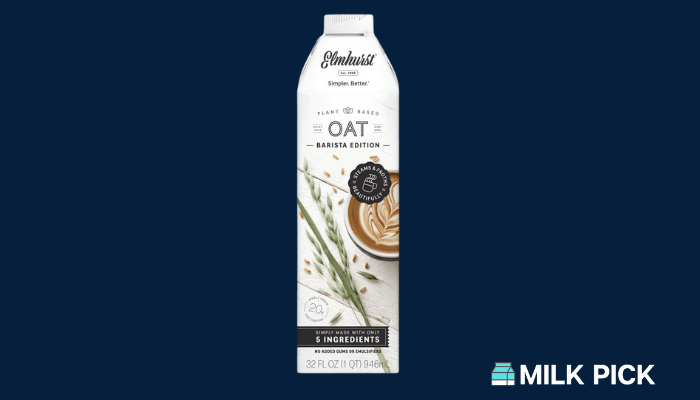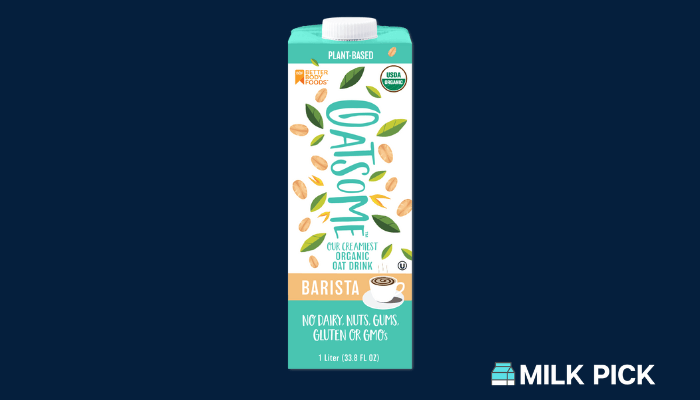When you order a cappuccino or latte with oat milk from a bonafide coffee house, you expect a drink with a creamy, frothy texture similar to dairy milk.
However, if you’ve tried to recreate these drinks at home with oat milk from the store, you have likely struggled to achieve the same lovely frothiness and texture.
This is because coffeehouses use barista oat milk over regular store-bought or homemade oat milk.
Barista oat milk uses a different formula to achieve a texture and “performance” similar to dairy milk or cream to satisfy customers.
Learn more about barista oat milk, including what it is, the difference between regular oat milk and barista oat milk, and some pros and cons of the beverage.
What Is Barista Oat Milk?
Barista oat milk is oat milk that is created with coffeehouse beverages in mind.
Plant-based milk labeled “barista” blend or similar are formulated to foam, steam, and stretch like dairy milk in warm drinks like lattes and cappuccino.

How Cow’s Milk Performs in Hot Drinks
Cow’s milk is naturally made of components such as protein, fat, and lactose (a complex sugar), which allow it to hold up to techniques like steaming.
These elements also give it a sweet taste and creamy texture.
Steaming dairy milk to just the right point, around 140°F, helps break down the lactose into simple sugars, making the drink taste even sweeter.
The proteins in milk, casein and whey, stabilize dairy milk as it’s heated.
This stabilization helps bubbles form and keep their shape, making the classic foam on top of cappuccinos, espressos, and lattes.
Related: Oat Milk vs. Dairy Milk
Regular Oat Milk VS. Barista Oat Milk?
So what is the difference between regular oat milk and barista oat milk that helps it act like dairy milk?
Essentially, barista oat milk uses more fat, sugars, and proteins to create a beverage that acts similar to cow milk.
Depending on the brand, the manufacturer may use processed oils like canola, sunflower, rapeseed, or emulsifiers like dipotassium phosphate.
Barista-style oat milk manufacturers may also add special enzymes that help break down proteins in the beverage.
This process allows baristas to achieve a foamy, frothy texture that mimics dairy milk.
Regular oat milk you buy at the supermarket is typically not made with this intent in mind, so it contains a lower fat, protein, and sugar count.
It may also have fewer stabilizers than barista oat milk because it doesn’t need to withstand high temperatures or steaming.
For example, a popular brand of barista oat milk is Elmhurst 1925 Barista Oat Milk.
According to the beverage’s nutritional facts label, it contains five ingredients (whole grain oats, filtered water, cane sugar, salt, and dipotassium phosphate) and offers the following in an 8-ounce serving:
- 90 calories
- 1 gram fat
- 17 grams carbohydrates
- 2 grams fiber
- 4 grams sugar
- 3 grams protein
The same brand’s unsweetened oat milk contains 100 calories, 1.5 grams fat, 18 grams carbohydrates, 2 grams fiber, 5 grams sugar, and 4 grams protein.
This option includes filtered water, whole grain oats, cane sugar, salt, and natural flavors.
The dipotassium phosphate likely gives this barista oat milk its unique texture.
Dipotassium phosphate is added to many dairy products like cheese, whipped cream, ice cream, and milk. It acts as an emulsifier and helps balance the food’s pH.

When Should You Use Barista Oat Milk?
Barista oat milk is often creamier than regular oat milk and is created to work perfectly in hot beverages.
Although you can easily use barista oat milk whenever you want, the following uses are ideal for this beverage:
- In baking. The extra smoothness and sweetness in barista oat milk makes it an excellent choice for baking. It can give your baked goods a moist, sweet flavor and work as a substitute for whole milk in recipes.
- In coffee drinks. Barista oat milk is made for hot coffee drinks like lattes, espressos, and cappuccinos. Use it liberally to achieve a rich foam, sweet taste, and creamy texture in your favorite coffee beverages.
- In tea. Similar to coffee, some tea-based beverages benefit from the addition of barista oat milk. Try it in a London Fog, red velvet tea latte, or your favorite chai recipe.
- In cooking. You can use barista oat milk in your regular recipes, for instance, in sauces to replace whole or 2% milk. Because it holds up to heat, barista oat milk can keep your sauce rich, tasteful, and creamy.
- For drinking. Barista oat milk is great on its own as a thick, creamy non-dairy drink.
Related: 8 Creative Ways to Use Oat Milk!
Pros of Barista Oat Milk
Barista oat milk has many benefits for people working at the coffeehouse and those who want to recreate their favorite coffee and tea beverages at home.
Functions like cow milk
The most significant benefit is that barista oat milk functions like regular cow’s milk.
Its chemical makeup is altered with ingredients like oils, enzymes, and emulsifiers to give it a thick consistency that stands up to heat.
Additionally, these additives allow barista oat milk to froth like dairy milk so that you can get a creamy foam on top of your favorite drinks.
Offers a plant-based alternative to dairy
Oat milk is a beneficial beverage because it offers a plant-based alternative to dairy.
Those who are lactose intolerant, meaning they suffer symptoms such as cramping or bloating after eating dairy, can indulge in their favorite coffeehouse drinks without worrying about how the milk will affect their body.
Oat milk is an excellent choice for those who are vegetarian or vegan as well, as it doesn’t contain any animal byproducts.
Offers a non-nut-based alternative to almond milk
Although almond milk is a popular plant-based milk, some people either can’t or don’t want to drink it.
Between .2% and .5% of people in the U.S. have an almond allergy, and around 9% to 15% of people with nut allergies have almond sensitivities.
For these people, barista oat milk offers a safe substitute for a plant-based diet.
Some people simply dislike the taste of almonds, and others disagree with the potentially unsustainable practices that go into some almond farming techniques.
Oat milk is an excellent option for those who don’t want that almondy taste, and oats are one of the most sustainably grown sources of plant-based milk, especially when compared to almond milk.
Related: What Does Oat Milk Taste Like?
Provides healthy vitamins and nutrients
Like regular oat milk, barista oat milk offers multiple vitamins and nutrients.
These include protein, calcium, iron, and potassium. Some brands are fortified with additional nutrients like Vitamin D, and Vitamin A.
Barista oat milk can help you maintain a plant-based diet, which can boost the amount of vitamins and nutrients you eat and improve your overall wellness.

Cons of Barista Oat Milk
While barista oat milk offers multiple benefits, there are also a few cons regarding the drink.
Often contains additives
To function like dairy milk, barista oat milk uses a different formula than the regular option.
This often means it contains additives that many people prefer to avoid.
For example, Dipotassium Phosphate, an additive in some barista oat milk, is a phosphate additive that can have adverse health effects for some people.
Some phosphate additives can negatively impact the gastrointestinal tract and, if ingested in high amounts, can be dangerous for people with renal problems.
Not suitable for people with diabetes
Oat milk is made from oats, which are complex carbohydrates.
This makes regular and barista oat milk high in carbohydrates, with about 21 grams of carbs per serving.
For people with diabetes who must limit their carb intake to monitor their blood sugar, barista oat milk might not be a suitable option.
Related: Is Oat Milk Good For Diabetics?
Not suitable for people on a Ketogenic diet
Similarly, people following a ketogenic diet likely want to avoid barista oat milk.
With 17 to 21 grams of carbs per serving, barista oat milk is a poor choice over other low-carb plant-based milk like
Not suitable for people with gluten sensitivity or Celiac Disease
Although oats are gluten-free, making them okay for people with Celiacs or gluten sensitivity, they are often processed with wheat.
This practice means that cross contamination in oat products is likely.
Those with sensitivities or Celiac Disease should avoid oat milk that doesn’t expressly clarify that it is manufactured in gluten-free conditions.
Additionally, those with oat allergies should avoid barista oat milk, as it can cause symptoms of an allergic reaction, including a rash near your mouth, nausea, stomach pain, or diarrhea.
Related: Is Oat Milk Gluten-Free?
Can You Buy Barista Oat Milk To Use At Home?
Thankfully, you can buy barista oat milk to use at home instead of spending extra money at the coffeehouse.

Elmhurst 1925 Barista Oat Milk is a popular barista oat milk option.
The brand is well-known for its high-quality plant-based milk products and uses a patented HydroRelease™ process that creates a creamy beverage without using ingredients like carrageenan.
This barista oat milk is gluten-free, kosher, and uses oats that are grown with sustainable practices.

Oatsome Barista Organic Oat Drink is another great option for at-home barista oat milk.
This oat milk boasts a frothy feel and uses ingredients like whole grain, gluten-free, organic oats, sea salt, and organic sunflower oil.
This oat milk has 180 calories per serving and 2 grams of protein.
Experiment With Barista Oat Milk
Barista oat milk is an accessible alternative to regular oat milk and dairy milk for mochas, cappuccinos, lattes, and tea.
It performs like cow’s milk, creating a rich, frothy beverage, and is ideal for those following a vegetarian or vegan diet.
Since you can buy barista oat milk at home, go ahead and experiment with the beverage and create your own coffeehouse drinks in the comfort of your kitchen.
